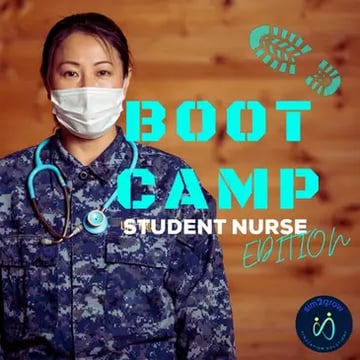What Is a Nursing Boot Camp and Why Should You Have One?
 Basic Training — frequently referred to as boot camp — prepares recruits for all elements of service: physical, mental and emotional. When you hear “Boot Camp”, you probably think about the military. Maybe you’re asking yourself – what does Boot Camp have to do with nursing students? Consider this: nursing students are also recruits, who will be engaged in a noble service, much like serving in the military. They need to be mentally, physically and emotionally prepared for the challenges posed by today's healthcare environment and ever-increasing patient complexity.
Basic Training — frequently referred to as boot camp — prepares recruits for all elements of service: physical, mental and emotional. When you hear “Boot Camp”, you probably think about the military. Maybe you’re asking yourself – what does Boot Camp have to do with nursing students? Consider this: nursing students are also recruits, who will be engaged in a noble service, much like serving in the military. They need to be mentally, physically and emotionally prepared for the challenges posed by today's healthcare environment and ever-increasing patient complexity.
Think of a Nursing Boot Camp as a time for your students to drill the basics, train their minds in clinical judgment, and practice collaborating with other recruits. Military Boot Camp occupies the first 8 weeks of a soldier’s career. Nursing Boot Camp happens every summer, when your students are most at risk for losing both their physical and mental fitness. Think of yourself and your fellow faculty as the Drill Instructors, who know just how hard the job really is and want to set their recruits up for success.
How Can You Plan a Successful Nursing Boot Camp?
 Remember this important military quote:
Remember this important military quote:
“He who fails to plan is planning to fail” (Winston Churchill)
- Get buy in from your program Dean or Director. This could be in the form of a short presentation, outlining the rationale for the activity, a set of learning objectives and your hypothesized results.
- Get buy in from your fellow faculty. This includes a commitment to help set up and/or execute the Boot camp. It can be challenging to recruit help for summer activities on campus, so you may want to consider a token of appreciation in the form of a gift card to the local coffee shop.
- Get buy in from your students. Generate interest with posters, messages in their online class platform and word of mouth. Limit the spaces available to encourage early sign up. Consider collecting a nominal fee (non-refundable) which further motivates attendance. This fee then can be used to purchase the faculty appreciation gift cards.
- Lastly, establish a planning committee of Nursing Boot Camp champions. Include representatives from the student population, faculty and your Sim team. Start early (March 1), make a calendar, and develop your activities. Begin offering sign-ups by mid-April.
Tips and Reminders for Your Nursing Boot Camp
A successful Nursing Boot Camp relies on the ability of the Planning Committee to be motivated, organized and efficient. Here are some tips and reminders to help you.
- Offer sessions on varying days at different times to accommodate summer schedules of both your student “recruits” and faculty “drill instructors”
- Pre-assign groups of “recruits” ahead of the session.
- Make your groups of “recruits” a mix of different academic levels
- Provide frequent reminders to “recruits” leading up to the date of their session.
- Do a dry run of the entire session with your “drill instructors” before the actual session
- Use rotating skill practice stations for the first half and run a “putting it all together” simulation activity for the second half.
- Have “recruits” complete an evaluation after each Nursing Boot Camp
- **Keep it simple! Remember this is to reinforce the basics, not to teach new skills or content.
- **Don’t overburden your “drill instructors” team and don’t overwhelm your “recruits”... not only do you want them to come back next summer, you want them to bring their friends as new “recruits”
Get Excited About Your Nursing Boot Camp
 It’s always easier to do something new when you have some great ideas to get you started. Consider the following content as your planning Committee gets to work.
It’s always easier to do something new when you have some great ideas to get you started. Consider the following content as your planning Committee gets to work.
- Skill practice stations such as sterile gloving, isolation procedures, safety scavenger hunt, urinary catheterization, IV infusion, medication administration, suctioning, dressing change, safe patient handling (patient transfer), basic life support skills
- Simulation-based activities to “put it all together” such as mini-patient care scenarios, table top simulations, SBARR activities, and the increasingly popular Escape Room.
.png?width=298&height=387&name=Mock%20Code%20Mystery%20Escape%20Room_edited%20(1).png) If you’ve never tried an Escape Room with your nursing students, we invite you to download our FREE, fully developed “MOCK CODE MYSTERY” escape room template today!
If you’ve never tried an Escape Room with your nursing students, we invite you to download our FREE, fully developed “MOCK CODE MYSTERY” escape room template today!

.jpg?width=352&name=s%20(5).jpg)

